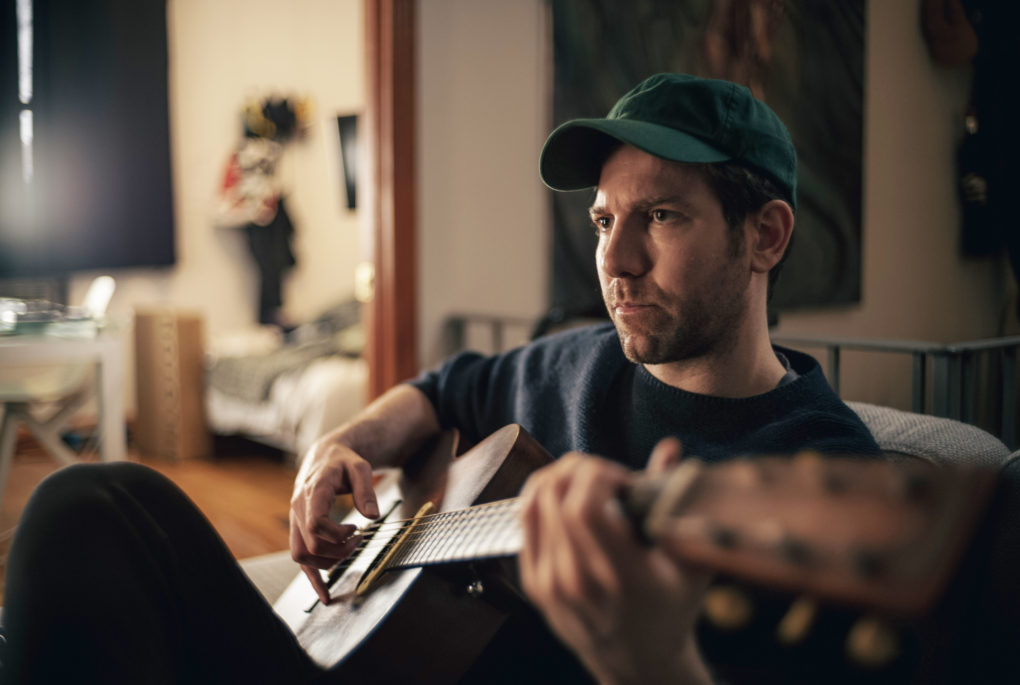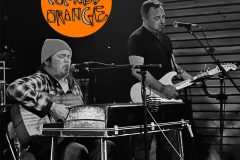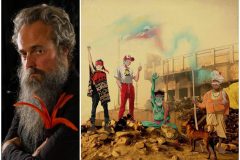Brooklyn’s own Best Breakfast has seemingly taken a page from the lords of indie rock Guided By Voices in terms of releasing music. The ensemble released their debut album Late 80’s Baby in the summer of 2020, followed by Seconds which dropped later in the same year. The dreamy-folk Panacea was released in November of 2021 and then to top it all off-Best Breakfast dropped the acoustic-tinged standalone single “Princess Di” in February 2022.
When the pandemic began, Best Breakfast began to take stock with how they were going to go about their next effort Clap If You Can. Collectively, the members agreed to move in together once the lockdowns emerged in hopes that the time spent would be beneficial. In a press release for Clap If You Can, Best Breakfast’s singer/guitarist/lead songwriter Ben Majest mentioned that this allowed the group to continue to write and compose new songs seamlessly. What also furthered the band’s close proximity to each other is an album that showcases a free-flowing compilation of tracks that are compelling. The album’s opener “Sole Purpose” extends listeners an indie-folk, guitar-driven experience. Following that is the garage rock influence “Shapeshifter”, and dreamy tracks such as “Wave”, and “Picture Perfect.”
We spoke with Majest to learn about the band and the album.
I’m curious about the story behind the band name. Would you care to explain to the readers?
Sure. The short answer is the band was named after a smoothie. I knew I was looking for something upbeat and positive sounding. I was with Poy (our drummer) before band practice and we stopped for our pre-rehearsal smoothie, which, lo and behold, was called the “Best Breakfast”. We agreed we liked the name and boom: Best Breakfast was born!
I’m pretty biased in saying that out of all the boroughs Brooklyn is my favorite. What do you say makes the area so special?
Well, it’s massive, the quality of life is generally high because there’s enough space to move around but enough density that you’re definitely in a metropolitan area, and the food is outstanding. I recently started spending more time around Prospect Park and it’s so beautiful. And I think once you get to the age where you start taking walks regularly, Brooklyn becomes the way to go.
What was the mindset behind the band when the pandemic began? I’m guessing you all were nervous and terrified about what the future held for the band itself.
We formed during the pandemic so the only thing we feared was covid. Chris, who plays lead guitar on a lot of the records, wasn’t gigging around the city on a nightly basis (this is what he usually does), and Ian, who does a lot of audio work with Lincoln Center and the NY philharmonic, had a lot more time on his hands. Poy’s in-person drum teaching schedule was put on pause. The shutdown of the world opened up this opportunity to create music. I usually Airbnb a couple of the rooms in my apartment and I wasn’t doing that, which put me in the position of being able to host people. So yeah, we were fortunate that the circumstances, as challenging as they were, allowed us to come together to create.
Do you feel that the whole process of putting together would have been different if you weren’t all together as much as you were during the pandemic?
Yeah, I probably should have read this question before diving head first into the last one, but the answer is absolutely. It’s safe to say that without the pandemic there would be no Best Breakfast, or that the band would look very different from what it is today.
How much emphasis was placed on taking time to create the new tracks? Did the band collectively see this period of time as the opportunity to slow down and really explore what you wanted to achieve?
It felt less deliberate than that. I wish I could say our efforts were well thought out and that we sat down and collectively decided on this broader vision, but it wasn’t that at all. People like to talk about the spirit and the vibe of music creation and lean into abstraction, but I find so much of music making comes down to the nuts and bolts of scheduling the right people working together for the right interval of time. Knowing you have to get “x” done in “y” weeks was all the motivation we needed to get through this project.
At any point being all together for so long did it feel that it was too much?
There were definitely moments where we needed to give each other space.
Clap If You Can is the fourth album in two years for the band. Do you foresee going about this pace moving forward in terms of releasing music?
It’s only difficult to sustain to the extent that it’s hard to get everyone to commit to making a record their sole focus for two weeks. During the pandemic, it was easy. Now that things have opened back up, not so much. But we’ll see.
Outside of being together for as long as you were with Clap If You Can, what would you say felt different in the writing and recording process?
The process felt disjointed compared to our previous two records. New York was opening up so we wrote and recorded in chunks as opposed to one concentrated block. I think that’s reflected in the sound and the way the record turned out.
Ben-what would say led you to start writing in your mid-20s and not sooner?
Pragmatism. Music making typically is not a great investment and I was poor in my early twenties, so I spent a lot of my twenties working so that I could get to a place where I was financially comfortable enough to take some creative risks in my 30s, and here we are.
Listening to the band’s library there are so many influences that emerge. What are some of the biggest components that you are looking to take away from the artists/bands that you listen to?
I listen for a pulse and if I like what I hear then I lean into trying to replicate the pulse of a song. I’ll certainly come up with an original progression or riff or melody but I know what pulse I’m aiming for.
With the lyrics for Clap If You Can (and honestly throughout the library), there’s a strong emphasis on strong storytelling that allows listeners to relate. How important is that for you when you are writing new songs?
It’s become a greater priority as my songwriting has grown. There used to be a running joke that I wrote about whatever was happening right in front of me, so if dinner had just been delivered, I would sing about that. If someone had just turned on When Harry Met Sally, suddenly you’d hear me singing about Meg Ryan. I like the associative aspect of songwriting so lately it’s been about turning those associations into stories, and narratives.
Something I took away from reading about you is that you don’t allow yourself and the band don’t overthink things. Being a director do you find that challenging? I always assumed that directors go about their work the opposite way.
Overthinking is the enemy of spontaneity. Often the things you like sonically or emotionally come from places that are tough to access if you overthink or over-analyze. You can’t control them like that. As far as being a director, it’s the same. You have your shoot days scheduled. You don’t want to overthink any single take. What you really need is coverage because what you’re focused on is the big picture of “do I have enough images to put together a full movie?” It’s similar to when you’re making an album. The question I often find myself asking is “is this song good enough where it is right now that I can shift to focusing on a new idea?”
I read that you have quite the following in Mexico. How special is it for you to be able to get back and perform there in the near future?
I speak fluent Spanish so getting down to Mexico to play for the wonderful people down there who have interacted with us and our music, would be so special. I hope we get to do it.
Clap If You Can is out now.
Photo Courtesy: Mike Kellogg








Social Media